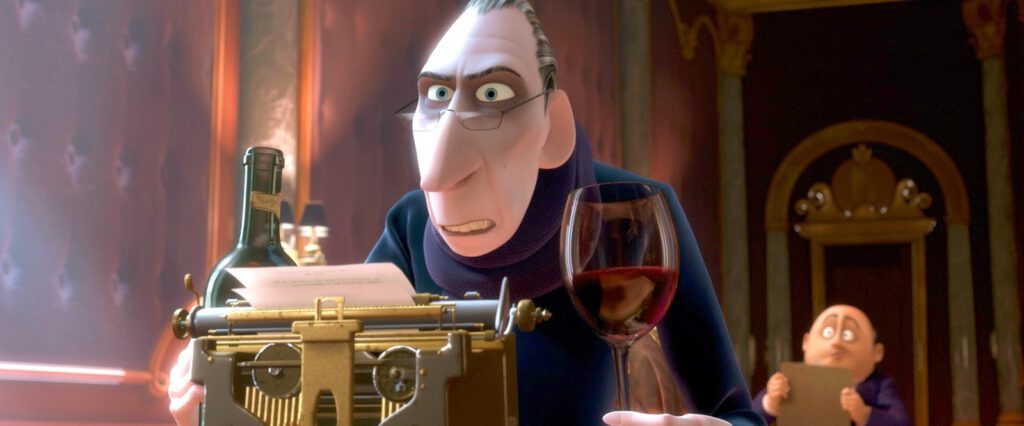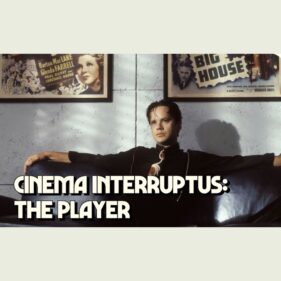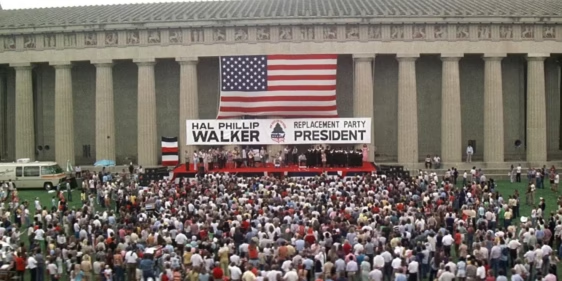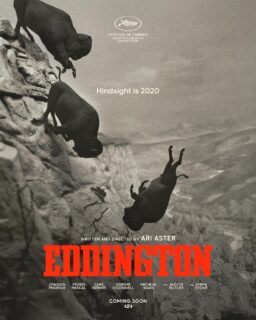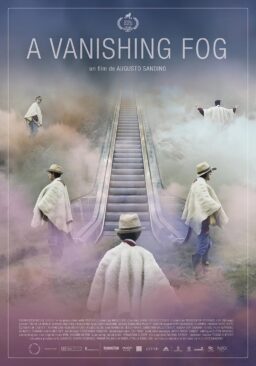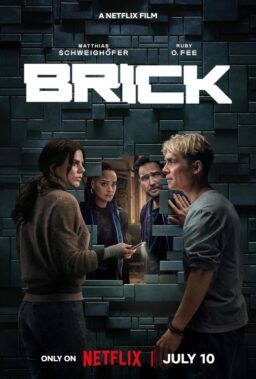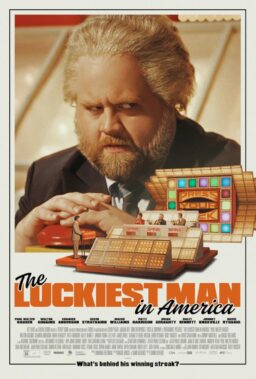From the Tempest in a Teapot department: actor Jesse Eisenberg surprised and infuriated a lot of my colleagues with his New Yorker “Shouts and Murmurs” piece this week, “An Honest Film Review.”
It’s written in the voice of a film critic reviewing a nonexistent “Stephen Kern” movie titled “Paintings of Cole.” As the piece goes along, we learn that the critic is not as detached as we might like. The film is about an artist who uses his paintings to send secret messages to police in order to “bring down the Italian mob”; this irks the critic right off the bat because he once wrote a similar story in grad school: “I failed the grad-school class, but Mr. Kern is getting early Oscar buzz. Justice? Not in this life.” The piece becomes a litany of resentments and regrets. The “studio girl” who let the critic into the screening has a name that begins with an “R” but he didn’t register it “because I was trying to work out whether sleeping with her would be a conflict of interest.” He wonders how the artist can afford to live in a West Village brownstone when “I’ve been writing movie reviews for a blog that attracts more than eight
hundred and forty-five unique views a month, and I live in the kind of
housing complex that rappers brag about escaping.” His confusion about plot details “could have been the fault of Kern’s screenplay, or it could have issued
from my sneaking out of the screening room to pee during an important
scene.” He notes that “the Times critic seemed to love the movie, which is no surprise, because the Times
loves everything. Well, everything except me. I went in for an
interview three years ago, with a résumé and a packet of my reviews, and
they rejected me.”
Salon’s Scott Timberg—who, in his defense, allows that he is not a critic—published a response titled, “Jesse Eisenberg is not funny: Please, New Yorker, stop publishing his hamfisted attempts at humor,” asking, among other things, “Do actors and people in the film world think that critics are so simple?
Maybe, especially those who get bad reviews and figure it must come
from personal spite.” “Any lazy assumptions about film critics Jesse Eisenberg missed here?” longtime Dissolve and A.V. Club critic Scott Tobias asked on Twitter. “Looks like BINGO to me.” “Wanna say ‘Jesse Eisenberg, you’re better than this,'” said my friend and fellow Vulture critic Bilge Ebiri, “but it really should be ‘New Yorker, YOU’RE better than this.'”
“I have to say there’s a weirdly sneaky evasion going on in his story,” wrote The Guardian‘s Peter Bradshaw,” “He doesn’t quite have the nerve to attack all film critics—just the
unimportant ones, the lower-rankers, the ones who aren’t the New York
Times, with whom he covertly makes common cause in the ranks of the
envied and the successful. His miserable, resentful, failing movie critic is reminiscent of Justin M Damiano, the imaginary film blogger created by the graphic novelist Daniel Clowes whose story was notoriously adapted without permission for a short film by Shia LaBeouf.
Eisenberg may possibly be aware of Daniel Clowes’s creation—but
Damiano was, as it happens, shown rather sympathetically, as someone
whose failings did at least have something to do with a genuine if
muddled love of what he was doing.
Not in Jesse Eisenberg’s story. His film critic is a dumb loser—but
the author draws a distinction between losers like this and the winners
who write for the New York Times and the mainstream press. And Eisenberg is of course appearing in the pages of one of the most
prestigious journals of all: the New Yorker. Punching down is one thing.
This is satirising down.”
Did Eisenberg, an Oscar-nominated actor whose performances have mostly
been well-regarded by critics, know he was throwing a rock (a
pebble, really) into a hornet’s nest by publishing this
piece? Apparently so. According to CriticWire, Eisenberg explained to Chicago Tribune writer Marc Caro Tuesday night that “the idea of ‘a narcissistic critic who thinks that he’s the
center of
the universe and his personal gripes are somehow worthy of being
publicized’ was too good to pass up, even if he admits that ‘good
critics don’t bring their own personal gripes.’
He went on, “I was just
doing a Woody Allen movie, and someone showed me a review of
his last movie. The review said something along
the lines of, ‘Woody Allen makes another movie. This one doesn’t really
work, but hey, he’s doing one a year. Slow down, Wood-man.’ And I
realized the guy was not criticizing the movie. He was criticizing his
own lack of productivity and laziness, vis-a-vis Woody Allen’s
productivity. But instead he was putting down the movie.”
There are a lot of simplistic assumptions being made here, in the original piece and in Eisenberg’s defense of it. Unfortunately they are common among filmmakers, actors, writers, indeed artists of all sorts who dismiss critics as failed artists, but only when a critic doesn’t like their latest work. Good criticism can itself be art, at times art that can stand alongside or even apart from the art that inspired it. This proposition has so many examples supporting it that I won’t list too many here; I’ll just say that anyone who’s read James Agee, Pauline Kael, Andrew Sarris, Otis Ferguson and the founder of this site will recognize its truth.
On top of that, my own encounters with (and in some cases friendships with) artists have demonstrated that animosity towards critics is often inconsistent and hypocritical. When reviews are negative, the artist looks for evidence of personal bias and uses it against the critic in order to undermine his or her assertions: They’re just jealous that they can’t make art. They just have it in for me for reasons that have nothing to do with the work. They didn’t understand what I was doing and this is proof of how stupid they are. And so on. But a positive review is proof that the critic “gets it” and has a discerning intellect and a big heart.
Still, the charge that critics who recoiled in outrage at Eisenberg’s piece are being thin-skinned has merit. I didn’t think his New Yorker piece was particularly good, not because of its anti-critic sentiments, but because the jokes seemed cheap and unimaginative, and there was no surprise in it. Eisenberg announces the critic’s insincerity, fatuousness and corruption up top, rather than letting the reader discover it and be incrementally delighted and appalled by it, which means the hero is not an unreliable narrator (which might have made the piece exciting to read) but a one-joke stereotype, of a sort that would bore the audience if he appeared in a screenplay credited to Jesse Eisenberg. Addison DeWitt in “All About Eve” and Anton Ego in “Ratatouille,” to name two fictional critics, are marvelous creations, even though they’re cruel, arrogant and petty, because they’re also complex and confounding and truly funny. DeWitt uses his clout to acquire perks, including sex with ambitious young actresses, and carries out feuds in print. Ego lords it over Paris and takes evident pleasure in terrorizing restaurateurs and chefs, and making readers flock like lemmings to places he likes and avoid establishments he pans. But you get a sense of what makes both characters tick, and you understand that they do have some kind of standards, even though they’re compromised by arrogance and other unflattering traits.
There are also instances where films present superficially unlikable, even hateful portraits of critics, and the image so offends working critics that they fail to appreciate what the character is saying. The critic in “Birdman,” for example, was rapped as a stereotype of a petty and power-mad theater reviewer, and she is rather cold and vicious; but if you listen to what she tells Michael Keaton’s character in that scene in the bar, you realize that, in her own mind, at least, she’s fighting on behalf of a riskier, less gimmicky sort of theater. This stance obliges her to pan the hero’s current project, which is more about re-positioning him in the acting marketplace than it is about putting on a great play. If she cut him any breaks she would be untrue to herself.
All that having been said, Eisenberg’s piece is onto something, though perhaps in ways that its score-settling writer may not have intended. It got me thinking about times I’ve allowed my opinion to be affected by external factors unrelated to the work onscreen. That’s all the time, though hopefully more to lesser degrees. It’s unavoidable. In fact, it’s human. Just as people get cranky with coworkers or snap at their kids because they’ve had a bad day, or a bad year, critics take whatever they happen to be going through and work through it in their writing.
At its best this can be a productive and illuminating exercise, as when, for instance, Odie Henderson wrote about “Boyz n the Hood” in relation to his own life experience, or when Roger Ebert wrote powerfully about “The Tree of Life” or “Synecdoche, New York” in a way that left no doubt that the films’ contemplation of mortality resonated with his then-current health problems. At its worst, life itself can affect the critic’s grasp of the work, and even color it in ways that the writer might regret later.
Here’s one example: Back in 1993, I went to see Jane Campion’s “The Piano” (a piece that’s not available online, thank God) at a 10 a.m. screening and had to violently pinch myself to keep from dozing off. This was no reflection on the film, which was excellent, but of the fact that I’d been up late drinking the night before and had arrived at the screening after a pancake breakfast. I kept drifting off during the middle part and there were sections of the narrative that were a blur when I had to compose the piece, and because this was the pre-Internet era, there was no easy way to check the details. Because it was the only screening of the film prior to its release in Dallas, I had to write the piece anyway. I don’t think the review was worthless, but it certainly was more vague than I would have liked, and when I read it later I was embarrassed by how weak it was.
There have been other examples of that sort of thing happening throughout my career: I’m late to a screening and have to ask somebody what happened in the first ten or even twenty minutes, or go to another screening and watch the part I missed and leave, which fills in the gap but doesn’t really give a complete picture, so to speak, because the story is fragmented in my mind.
My side projects have also affected my critical judgment. I now realize that a lot of my reviews of low-budget films shot on video in the mid-aughts were colored by the fact that I’d produced one such movie and directed another. I was slightly more sympathetic to films in the vein of what I’d done myself, and slightly harder on movies in a vein that were entirely unlike anything it would’ve occurred to me to do. I don’t think I’ve ever panned a film because it reminded me of a story I wrote in school, or because the actress in it reminded me an ex-girlfriend, but these things fall under the realm of the subjective, so I can’t say for sure. I might make one claim about a review and my therapist might make another.
Scheduling and endurance are factors as well. I’ve been a bit harsher on movies that were not screened for critics in time for my deadline, that I had to go see at 11 a.m. on a Friday and turn around immediately, not because I’m trying to teach anyone a lesson, but because when you have to work under less-than-ideal conditions, it’s hard to keep a trace of resentment from creeping into the prose (sometimes more than a trace). And I’ve said publicly many times that I feel sorry for filmmakers whose work is screened during the awards season, when releases pile up in anticipation of critics’ groups voting and reviewers sometimes have to see three or even four films in a day. The film that screens first on a day like that is sure to get a more welcoming reception (provided the critic is a morning person!) than the film that screens third or fourth, because by the time the 8 p.m. screening rolls around, there’s a good chance that the critic has been rushing all over town all day and might not have had a chance to eat anything, or even take a proper bathroom break. When you’re on your twelfth film in four days sometimes you judge that film with a jaundiced eye, not because it deserves it, but because by that point you’re sick of movies.
I admit all this not to excuse or confess anything, merely to suggest that Eisenberg isn’t out of bounds to make sport of the idea that critics are capable of objectivity in the manner of a scientist evaluating a soil sample (and even the scientist might be carrying external issues into the lab).
If you’re an actor, you deal with some of the same problems on the job: You’re going through a nasty divorce, but you have to convince as a character in who’s just fallen in love and sees a rosy future ahead. Your father just died and you have to play a character who’s all smiles. You’re having a terrific period in your life but you have to play a character who’s suffering unimaginable pain. This is, of course, the reason why the phrase “the show must go on” was invented, and the best actors do rise to the occasion and convince you that the character is simply existing onscreen, unconnected to anything happening on the set or in the performer’s private life. But if you talk to these same actors in private moments they may confess that the performance you liked so much was not as focused or true as it might have been, because of whatever was happening beyond the frame line, and that they wish that they could do it over, and do it right.

